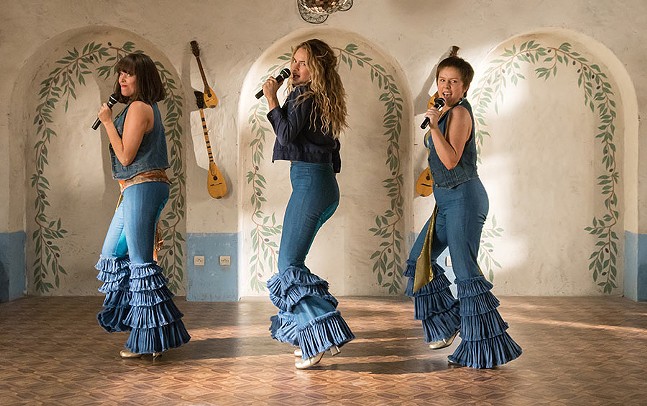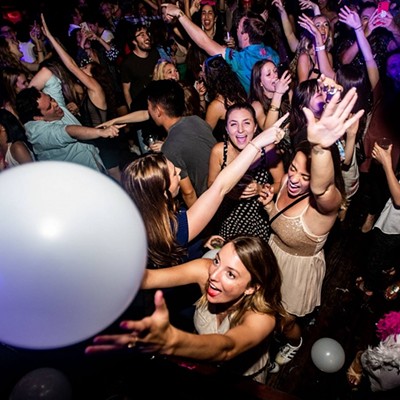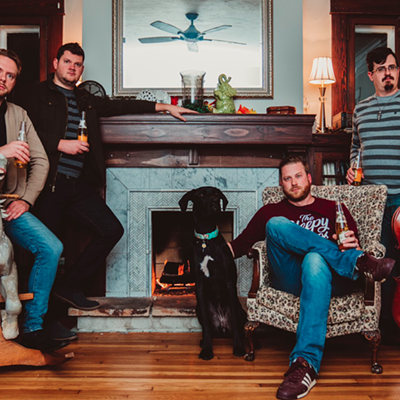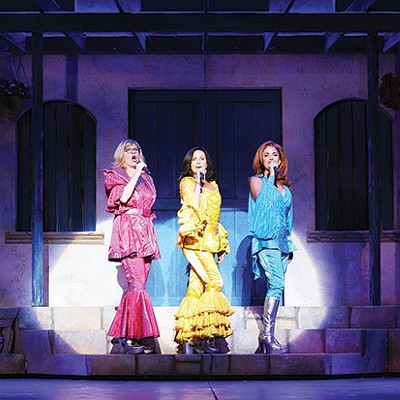The only time I’ve been at a party where the cops showed up was in college when “Dancing Queen” came on and all the girls started singing it together, so loudly that a neighbor called in a noise complaint. ABBA’s music creates an unmatched high, tapping into some deep corner of the brain that says, "I should start wearing a silver jumpsuit at all times." Mamma Mia! is a movie (and stage play) built on nothing more than the idea that we should all listen to more ABBA.
If you are wondering if the follow-up, Mamma Mia! Here We Go Again, is good, then you're already asking the wrong question. The Mamma Mia universe exists outside the dichotomy of "good" and "bad." It exists outside of space and time. It doesn't know sense or logic; only joy, love, and ABBA.
Here We Go Again opens five years after the original left off. Sophie (Amanda Seyfried) and her stepdad Sam (Pierce Brosnan) are prepping for the opening of the recently remodeled hotel in Greece that her mother and his wife Donna (Meryl Streep) dreamt of. Donna died a year ago and everyone is still learning to grieve, musically. Everything begins to spin out (as much as it can in this universe) when Sophie's relationship with Sky (Dominic Cooper) is on the rocks and a storm impedes the opening. The movie flashes between these present day scenarios and the scenes of Young Donna's (Lily James) adventurous life immediately following high school graduation that led her to raising a daughter alone on an isolated Greek Island.
We meet the young version of the three potential dads from the original story (nice but forgettable boys), and of course see the three dads themselves return (Colin Firth, Pierce Brosnan, Stellan Skarsgard). Donna's best friends Tanya (Christine Baranski) and Rosie (Julie Waters) return too, along with their junior selves.
There are more poignant moments in the sequel involving heartbreak and mourning, but it's still mostly full of fun. Cher rides in on a helicopter. Colin Firth and Stellan Skarsgard do the Titanic move. Christine Baranski says the line, "Be still my beating vagina."
The movie is just as jam-packed with musical numbers as you'd expect, blending old favorites, underrated jams, and deep cuts. The opening number "When I Kissed the Teacher" executes an insane lyrical premise into an even more insane reality, as Young Donna gets her entire graduating class in cap and gowns to break into song and choreographed dance. The reprisal of "Dancing Queen" is somehow, impossibly, even more over the top than the first iteration, transporting the audience to a previously uncharted plane of euphoria.
James' sweet and strong voice carries the brunt of the singing responsibility, and rightfully so. Her charm, too, is powerful. Every man who meets Young Donna falls in love with her, which only makes sense. It wouldn't make sense if they didn't fall in love. Brosnan's dreaded singing hasn't improved since the first, and neither has Firth's dancing. Cooper's lost some of his spark, but none of that really matters. It's a testament to the sheer power of Mamma Mia that all the actors from the first movie returned.
Everyone is tanned and glowing and thrilled to be there.



















